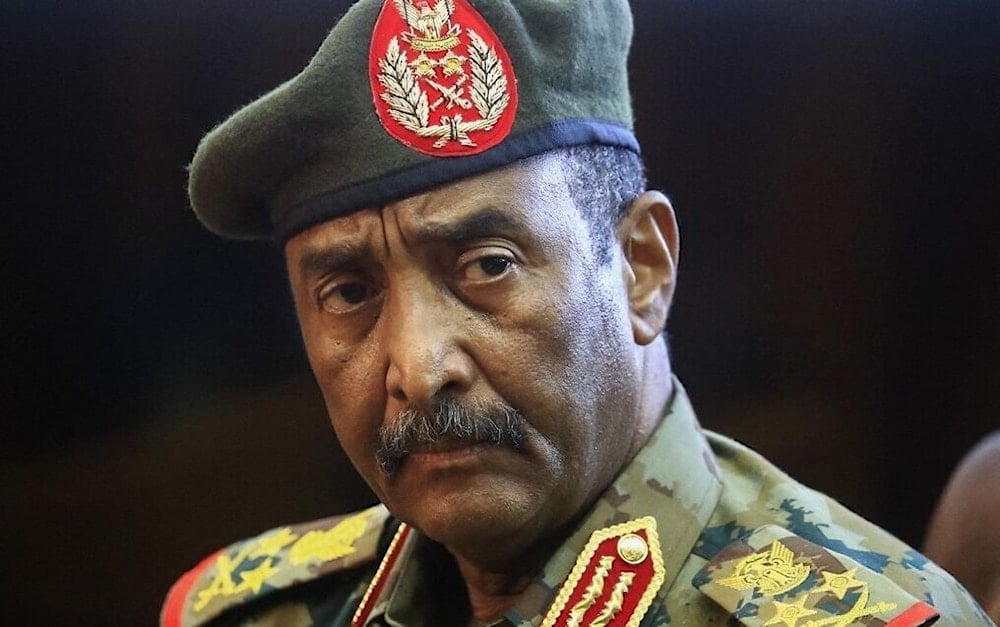No truce or peace until rebels disarm: Sudan's Al-Burhan
Al-Burhan vowed there would be no truce, dialogue, or peace with the RSF unless it disarms, insisting the war will end only through the rebels' defeat and calling on all armed Sudanese to join the fight.
-

Sudanese Gen. Abdel Fattah al-Burhan speaks during a press conference at the General Command of the Armed Forces in Khartoum, on October 26, 2021. (Ashraf Shazly/AFP)
The head of Sudan’s Transitional Sovereignty Council, Abdel Fattah al-Burhan, on Friday rejected any truce or peace agreement with the Rapid Support Forces (RSF) unless they first lay down their weapons.
Addressing a crowd during a visit to the village of Al-Suraih in Al-Jazira State in central Sudan, al-Burhan said: "If the rebels do not put their weapons down and come to the table, there will be no dialogue and no peace. We will not accept them in Sudan, nor anyone who supports them."
He continued, "We will remain steadfast in this approach. Either we eliminate them, or we fight them to the death. There will be no truce, no dialogue, and no peace between us and them," noting that "every Sudanese has been scarred by this war," and that the country’s "national unity and shared destiny" remain intact.
Al-Burhan stressed that from the very beginning, the army has been determined that "this war will end only by ending these rebels (…) The Sudanese people have suffered at their hands — they have killed, tortured, looted, and acted with brutality. They will receive from us only what makes them taste the suffering they inflicted."
He concluded by saying that "the battle against the Rapid Support Forces will not end without everyone’s participation," calling on all those who possess weapons to join the fight, and asserting that "this war will not end through negotiations or a truce, but through defeating the rebellion."
War Deadlock
His comments come as the RSF has stepped up its campaign on multiple fronts, seizing El Fasher and other key locations in Darfur, pushing eastward toward North Kordofan, and facing mounting accusations of massacres and atrocities against civilians in the areas under its control.
At the same time, the RSF has sought to present itself as open to diplomatic efforts, announcing on November 7 that it agreed to a humanitarian truce proposed by the United States, the UAE, Saudi Arabia, and Egypt, a move it framed as a humanitarian gesture aimed at alleviating civilian suffering and paving the way for broader talks.
But this declaration has been met with outright rejection from Khartoum. Just days later, on November 10, Darfur’s regional governor Minni Arcua Minnawi reiterated that "there is no truce with the killers of the Sudanese people," accusing RSF commanders of crimes in El Fasher that "they will not be able to cover up."
While the RSF has recently signaled its acceptance of a humanitarian truce, the Sudanese Armed Forces continue to reject any initiative that places the RSF on equal footing or allows it to retain armed formations.
Regional and international mediation efforts, from the African Union to IGAD and the United Nations, remain stalled, with no formal negotiations underway.
Vanishing Civilians
Meanwhile, the humanitarian toll is rapidly escalating. Earlier today, the UN warned that tens of thousands of people who fled El Fasher remain unaccounted for following the RSF’s takeover of the city, amid mounting reports of rape, abductions, forced recruitment, and mass killings.
UN agencies describe a protection crisis of unprecedented scale, with nearly 100,000 displaced from El Fasher alone and many vanishing along escape routes as armed groups block or redirect civilians.
Satellite imagery cited by UN investigators shows bloodstains visible from space, while survivors recount starvation tactics, destroyed neighborhoods, and targeted attacks on non-Arab communities.
Read more: UN unanimously approves Sudan fact-finding mission to probe RSF crimes

 4 Min Read
4 Min Read









